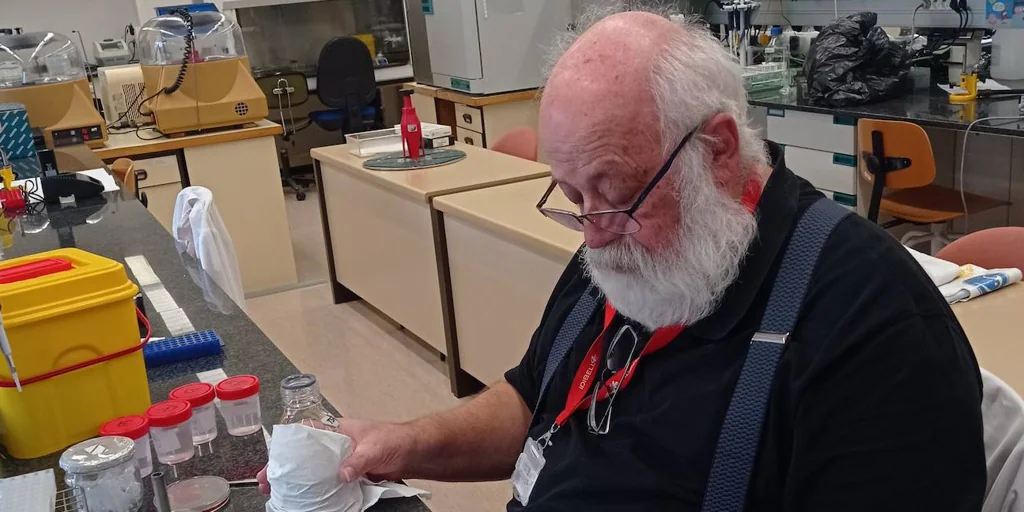the Ig Nobel Prizeswhich is sponsored by Harvard universityIn the United State and recognition of the achievements thatFirst they make you laugh and then you think“, were presented yesterday in an online ceremony. One of the ten awards went to Scientists from Argentina and Spain What they got Study the mental activities of people who are experts at speaking backwards.
The group of researchers who have been recognized consists of: Maria José Torres Priores, Diana Lopez Barroso, Estela Camara, Saul Fittipaldi, Lucas Cedeño, Agustín Ibáñez, Marcelo Bertier, And Adolfo Garcia. The study was published in the journal Scientific reports.
During the IgNobel Awards ceremony, Dr. Garcia spoke about how the research began. “I discovered that the chief photographer at an entertainment magazine had a habit of talking backwards,” he said. For example, instead of saying “Long live tango,” the photographer says “ognat le aviv.”
During long photo shoots with models, he would speak to them backwards, record their pronunciations, and then turn the audio on to pass the time. The scientist Garcia interviewed him and confirmed that his ability to speak backwards was exceptional.
Then he discovered that there was Reverse Speakers Association, who come together to speak using reverse phrases. Hence an experimental design to explore this strange ability.
“We ended up calling in several reverse speakers and built the strangest stimuli in our careers so that they and normal people could produce different words, phrases and sentences back and forth,” he said.
The study may be amazing, but it has its own characteristics Scientific justification. Reverse speech is “an excellent model for studying a fundamental aspect of human speech: the ability to sequence phonemes (the categories of sounds in a language).”
That human ability allows it Break up words Such as “case”, “bag”, and “thing”, which are among the basic principles of verbal communication. “on the principle, Opposite of speech He added: “It involves changing the order of phonemes while maintaining their identity, so people who constantly practice it must have specific brain patterns to manage their highly skilled phoneme sequencing.”
A group of researchers from Spain and Argentina He found that reverse speakers, compared to the control group, were better at reversing speech, but had no advantage in regular speech.
Moreover, they demonstrated specific structural and functional configurations along the dorsal and central pathways, which support multiple phonological processes with support from visual and field-general associative areas. These findings reveal that high phoneme sequencing skills depend on large brain networks that extend beyond classical phonological circuits.
They also support the view that The human mind can develop specific paths Depending on the linguistic demands imposed on them in daily life.
In the category Chemistry and geologyhad won Jan ZalasiewiczPolish geologist V University of Leicester, United Kingdom. He was “To explain why so many scientists want to lick rocks.”
Mineral particles in rocks stand out better on wet surfaces than on dry surfaces. So licking them makes it easy to recognize them instantly.
Zalasiewicz is nostalgic for the days when scientists did more than just lick rocks: They cooked and, in some cases, eaten the materials they studied, he noted in an article for the university’s newsletter. Paleontological Society. “We have lost the art of identifying rocks by their flavour,” he lamented. Creative rock fishing techniques are described in the article.
The annual Egg Nobel ceremony is on its way 33rd edition It draws attention to Legitimate scientific works Which has some unexpected or humorous aspects. The jury awards categories, ranging from the traditional Nobel Prizes in Physics, Chemistry, Physiology or Medicine, Literature and Peace, to other prizes such as Public Health.
This year, the Public Health Award went to a urologist Stanford University Seung Min Park For his inventionStanford toiletIt is a “smart” toilet that can monitor a person’s health by analyzing urine and stool.
The device allows urine analysis Signs of inflammation, diabetes and other diseases. A computer vision system calculates the speed and amount of urine being released; The sensor identifies each user based on the unique characteristics of their anus.
The Literature Prize was awarded to researchers from France, the United Kingdom, Malaysia and Finlandwho study a phenomenon known as “Jamais Fu.” It consists of a person perceiving something familiar as unknown. He is On the contrary “deja vu”. Team member Akira O’Connornerves University of St Andrews, He explained that it is possible to recreate this sensation in the laboratory by having people repeat a single word several times, until the word begins to sound unrecognizable.
The team of researchers that won this year’s Ig Nobel Prize Medicine Examining the noses of human cadavers to determine whether there are the same number of hairs in each nostril. “The information we needed was not available in anatomy textbooks, so we decided to find out for ourselves,” explained team leader Natasa Misinkovska, a dermatologist at the centre. University of California, Irvine, United State.
The study could help guide treatment for patients with alopecia, A disease that causes hair loss. People suffering from alopecia They usually lose their nose hair, Misinkowski explained what makes them Prone to allergies and infections.
“Our intention to describe human nasal hair growth patterns may seem unusual, but it arose from the need to better understand the role they play as first-line sentinels of the respiratory system,” the scientist told the magazine. Sciences.
Another group of Researchers from Spain with colleagues from the United Kingdom Won the IgNobel Prize physical. They are Enrique Nogueira, Miguel Guilcuto, Esperanza Brolon, Antonio Comesaña, Damien Bouvard, Alberto Navaira Garabato, and Beatriz Mourinho Carballido. What they did was measure to what extent Sexual activity of anchovies Affects the mixture Ocean water. “It is the most attractive investigation of my entire life,” Mourinho Carballido said.
Among the other investigations that were awarded was a study that explored Revive dead spiders to use as mechanical capture tools. In the category educationacknowledge the work that confirms that “ boring It is ubiquitous among schoolchildren” and argues that there is a preconceived attitude that leads to its intensification. “Students who expect the lesson to be boring to them are more bored.”

:quality(85)/cloudfront-us-east-1.images.arcpublishing.com/infobae/DHZROMRILZFFXPCBFG2FSFVQIM.jpg)



